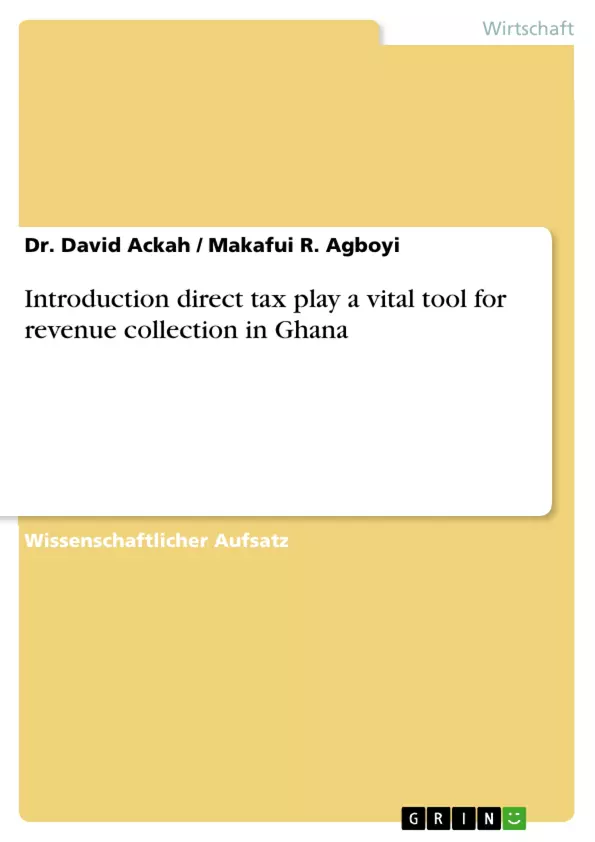The introduction of direct tax has been a vital tool for revenue collection in Ghana. This study reveals that, revenue acquired from this type of tax is considered very crucial in the development of the country, hence a major source of revenue to the government.
Direct tax was introduced in Ghana to subject the assessable income of income earners to tax, but unfortunately in Ghana, the collection of tax is confronted with numerous problems and thus tax evasion, tax avoidance, improper books of account, non-compliance of tax laws and inadequate logistics.
This research therefore aims at evaluating the effectiveness of direct tax administration in the informal sector in Ghana. Questionnaires were administered to five (5) staff members of the Internal Revenue Service (IRS) and twenty-five (25) to the traders of the Abossey Okai environs.
A simple sampling technique was used to aid in the selection of respondents. Responses from the IRS staff and the traders of the Abossey Okai environs were tabulated and analyzed.
The study finds out that the traders in Abossey Okai are ignorant about what direct tax is about. However one major recommendation is for IRS to make it their priority to embark on educational programs for the traders in the Abossey Okai environs in order to enhance the effectiveness of direct tax administration in the informal sector in Ghana.
Inhaltsverzeichnis
- INTRODUCTION DIRECT TAX PLAY A VITAL TOOL FOR REVENUE COLLECTION IN GHANA
- ABSTRACT
- INTRODUCTION
- LITERATURE REVIEW
- HISTORY OF TAX IN GHANA
- TAX COMPLIANCE
- RETURN
- SUBMISSION DATES FOR FILING RETURNS
- EXTENSIONS OF TIME TO FURNISH A RETURN OF INCOME
- CASES WHERE RETURN OF INCOME NOT REQUIRED
- FAILURE TO FURNISH RETURNS
- THE CONCEPT OF DIRECT TAXATION IN GHANA
- CORPORATE INCOME TAX
- INDIVIDUAL INCOME TAX
- CAPITAL GAINS TAX
- GIFT TAX
- STAMP DUTY
- PETROLEUM INCOME TAX AND PROVISION OF GENERAL TAXATION
- TAXING THE INFORMAL SECTOR
- REVENUE NEEDS
- FASTER GROWTH OF THE INFORMAL SECTOR
- DEMANDS FROM THE INFORMAL SECTOR
- THE IMPACT ON TAX COMPLIANCE IN THE FORMAL SECTOR
Zielsetzung und Themenschwerpunkte
Diese Forschungsarbeit untersucht die Effektivität der direkten Steuerverwaltung im informellen Sektor in Ghana. Sie zielt darauf ab, das Verständnis für die Herausforderungen und Möglichkeiten der Steuererhebung in diesem wachsenden Sektor zu verbessern. Die Studie analysiert die Faktoren, die die Steuercompliance im informellen Sektor beeinflussen, und untersucht, wie die Internal Revenue Service (IRS) die Effektivität der direkten Steuerverwaltung in diesem Bereich verbessern kann.
- Die Bedeutung direkter Steuern für die Einnahmenerhebung in Ghana
- Die Herausforderungen der direkten Steuerverwaltung im informellen Sektor
- Die Rolle der Internal Revenue Service (IRS) bei der Steuererhebung im informellen Sektor
- Die Auswirkungen der Steuercompliance im informellen Sektor auf die formale Wirtschaft
- Möglichkeiten zur Verbesserung der Effektivität der direkten Steuerverwaltung im informellen Sektor
Zusammenfassung der Kapitel
- INTRODUCTION DIRECT TAX PLAY A VITAL TOOL FOR REVENUE COLLECTION IN GHANA: Dieser Abschnitt stellt die Bedeutung direkter Steuern für die Einnahmenerhebung in Ghana dar und beleuchtet die Herausforderungen, die mit der Steuerverwaltung im informellen Sektor verbunden sind.
- ABSTRACT: Diese Zusammenfassung bietet eine kurze Übersicht über die Ziele, Methoden und Ergebnisse der Forschungsarbeit.
- INTRODUCTION: Hier wird der Kontext der Steuererhebung in Ghana erläutert, wobei die verschiedenen Steuerarten und die Bedeutung der Einnahmen für die öffentliche Ausgaben hervorgehoben werden.
- LITERATURE REVIEW: Dieser Abschnitt bietet einen Überblick über die relevante Literatur zum Thema der Steuerverwaltung im informellen Sektor, mit besonderem Schwerpunkt auf dem ghanaischen Kontext.
- HISTORY OF TAX IN GHANA: Dieser Abschnitt bietet eine historische Übersicht über die Entwicklung der Steuergesetze und -verwaltung in Ghana, die von der Einführung der Einkommensteuer im Zweiten Weltkrieg bis zu den jüngsten Reformen reicht.
- TAX COMPLIANCE: Dieser Abschnitt untersucht die rechtlichen Anforderungen an die Steuercompliance in Ghana, einschließlich der Anforderungen an die Steuererklärung, die Einreichungsfristen und die Strafen bei Nichtbeachtung der Vorschriften.
- THE CONCEPT OF DIRECT TAXATION IN GHANA: Dieser Abschnitt erläutert verschiedene Formen der direkten Steuer in Ghana, wie z.B. Einkommensteuer, Kapitalertragssteuer, Schenkungsteuer, Stempelsteuer und Erdöleinkommensteuer.
- TAXING THE INFORMAL SECTOR: Dieser Abschnitt untersucht die Bedeutung der Steuererhebung im informellen Sektor in Ghana und die Herausforderungen, die mit der Erweiterung der Steuerbasis auf diesen Sektor verbunden sind.
Schlüsselwörter
Die Forschungsarbeit konzentriert sich auf die Themen der direkten Steuerverwaltung, des informellen Sektors, der Steuercompliance, der Internal Revenue Service (IRS), der Einnahmenerhebung, der Steuerpolitik und der Wirtschaftsentwicklung in Ghana. Sie befasst sich mit wichtigen Themen wie der Bedeutung von Steuererhebung für die Entwicklung, den Herausforderungen der Steuerverwaltung im informellen Sektor und den Möglichkeiten, die Steuercompliance in diesem Sektor zu verbessern.
Häufig gestellte Fragen
Warum sind direkte Steuern für Ghana so wichtig?
Direkte Steuern sind ein entscheidendes Instrument zur Einnahmenerhebung und spielen eine wesentliche Rolle bei der Finanzierung der nationalen Entwicklung und der öffentlichen Ausgaben der Regierung.
Welche Probleme gibt es bei der Steuererhebung in Ghana?
Die Steuererhebung ist mit Herausforderungen wie Steuerhinterziehung, Steuervermeidung, unzureichender Buchführung, Nichteinhaltung von Steuergesetzen und mangelhafter Logistik konfrontiert.
Was sind die größten Hürden im informellen Sektor?
Im informellen Sektor, wie zum Beispiel bei den Händlern in Abossey Okai, herrscht oft Unwissenheit darüber, was direkte Steuern überhaupt sind, was die Verwaltung erschwert.
Welche Arten von direkten Steuern gibt es in Ghana?
Zu den Formen der direkten Besteuerung gehören unter anderem die Einkommensteuer für Unternehmen und Einzelpersonen, die Kapitalertragssteuer, die Schenkungsteuer und die Stempelsteuer.
Wie kann die Steuerverwaltung im informellen Sektor verbessert werden?
Eine zentrale Empfehlung ist, dass der Internal Revenue Service (IRS) Bildungsprogramme für Händler durchführt, um das Bewusstsein und die Compliance zu erhöhen.
- Quote paper
- Dr. David Ackah (Author), Makafui R. Agboyi (Author), 2014, Introduction direct tax play a vital tool for revenue collection in Ghana, Munich, GRIN Verlag, https://www.grin.com/document/283895



